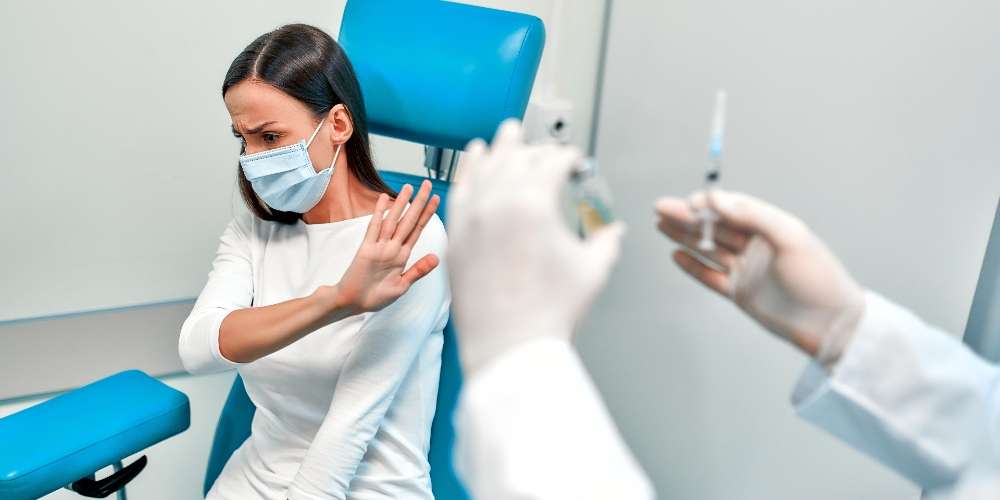Subscribe for free to the America First Report newsletter.
Several recent studies have indicated the Covid-19 vaccines actually increase the risk of contracting the disease over time, but these studies have been ignored or even debunked by corporate media and Big Pharma for months. Now, they’ll have to contend with a new study published in the highly respected New England Journal of Medicine.
This study was huge in scale, sifting through data collected from over 100,000 people infected by the Omicron variant. It lends credibility to the statistical significance of the findings, which are absolutely startling. Here are the key points:
- Those who have been “fully vaccinated” with two shots from Moderna or Pfizer are more likely to contract Covid-19 than those who have not been vaccinated at all
- Booster shots offer protection approximately equal to natural immunity, but the benefits wane after 2-5 months
- Natural immunity lasts for at least 300-days, which is the length of the study; it likely lasts much longer
This jibes with the current narrative coming from Big Pharma and their minions in government and corporate media that the jabs are supposed to mitigate the effects. But even that claim has been called into question as recent studies indicate the vaccinated may be dying even more than the unvaccinated. According to The Exposé:
The Government of Canada has confirmed that the vaccinated population account for 4 in every 5 Covid-19 deaths to have occurred across the country since the middle of February 2022, and 70% of those deaths have been among the triple vaccinated population.
Despite the scope of the study and the credibility of the source, it will not receive any attention from corporate media. It is imperative that our readers get the word out because this is an absolute narrative-buster for Big Pharma. Now more than ever, we must alert the people of the truth because we are on the verge of seeing millions of children under the age of five-years-old injected.
The good news is we’ve seen more vaccinated people becoming receptive to the truth. That’s anecdotal, based on what I’m seeing online and the correspondence I receive, but I believe there are more people who are becoming skeptical of governments’ unhinged push for universal vaccinations. If we can share more news that will keep them from getting boosted, and more importantly keep them from jabbing their children, then it’s a worthwhile effort.
If this is, as I believe, part of a nefarious plan to control people and enact the globalist elites’ depopulation agenda, then it behooves us to prevent as many people as possible from getting boosted. The science seems to indicate more shots mean more damage, so limiting exposure is important. We’re going to need allies if things continue down this road. The fewer booster-addicted Americans, the better.
Here are the details regarding the news study published in the New England Journal of Medicine in an article by Marina Zhang from our premium news partners at The Epoch Times:
Vaccination Increases Risk of COVID-19, But Infection Without Vaccination Gives Immunity: Study
Having two doses of a COVID-19 vaccine has been linked with negative protection against the disease, scientists say, while a previous infection without vaccination offers around 50 percent immunity, according to a study analyzing the Omicron wave in Qatar.
The study, published in the New England Journal of Medicine on June 15, examined the Omicron wave in Qatar that occurred from around December 2021 to February 2022, comparing vaccination rates and immunity among more than 100,000 Omicron infected and non-infected individuals.
Coffee the Christian way: Promised Grounds
The authors of the study found that those who had a prior infection but no vaccination had a 46.1 and 50 percent immunity against the two subvariants of the Omicron variant, even at an interval of more than 300 days since the previous infection.
However, individuals who received two doses of the Pfizer and Moderna vaccine but had no previous infection, were found with negative immunity against both BA.1 and BA.2 Omicron subvariants, indicating an increased risk of contracting COVID-19 than an average person.
Over six months after getting two doses of the Pfizer vaccine, immunity against any Omicron infection dropped to -3.4 percent. But for two doses of the Moderna vaccine, immunity against any Omicron infection dropped to -10.3 percent after more than six months since the last injection.
Though the authors reported that three doses of the Pfizer vaccine increased immunity to over 50 percent, this was measured just over 40 days after the third vaccination, which is a very short interval. In comparison, natural immunity persisted at around 50 percent when measured over 300 days after the previous infection, while immunity levels fell to negative figures 270 days after the second dose of vaccine.
These figures indicate a risk of waning immunity for the third vaccine dose as time progresses.
The findings are supported by another recent study from Israel that also found natural immunity waned significantly more slowly compared to artificial, or vaccinated, immunity. The study found that both natural and artificial immunity waned over time.
Individuals that were previously infected but not vaccinated had half the risks of reinfection as compared to those that were vaccinated with two doses but not infected.
“Natural immunity wins again,” Dr. Martin Adel Makary, a public policy researcher at Johns Hopkins University, wrote on Twitter, referring to the Israeli study.
- Concerned about your life’s savings as the multiple challenges decimate retirement accounts? You’re not alone. Find out how Genesis Precious Metals can help you secure your wealth with a proper self-directed IRA backed by physical precious metals.
“Among persons who had been previously infected with SARS-CoV-2, protection against reinfection decreased as the time increased,” the authors concluded, “however, this protection was higher” than protection conferred in the same time interval through two doses of the vaccine.
Enrico Trigoso contributed to this report.
It’s becoming increasingly clear that fiat currencies across the globe, including the U.S. Dollar, are under attack. Paper money is losing its value, translating into insane inflation and less value in our life’s savings.
Genesis Gold Group believes physical precious metals are an amazing option for those seeking to move their wealth or retirement to higher ground. Whether Central Bank Digital Currencies replace current fiat currencies or not, precious metals are poised to retain or even increase in value. This is why central banks and mega-asset managers like BlackRock are moving much of their holdings to precious metals.
As a Christian company, Genesis Gold Group has maintained a perfect 5 out of 5 rating with the Better Business Bureau. Their faith-driven values allow them to help Americans protect their life’s savings without the gimmicks used by most precious metals companies. Reach out to them today to see how they can streamline the rollover or transfer of your current and previous retirement accounts.







